SDSU’s offense reaches new low with three-point second half against New Mexico
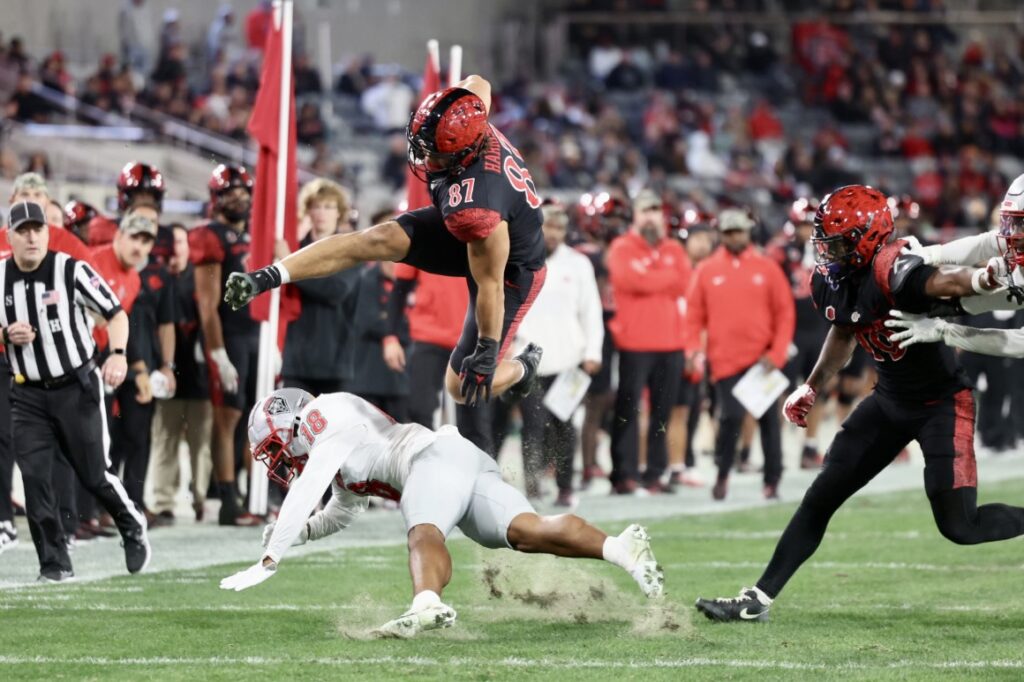
Michael Harrison breaks a tackle against New Mexico. (PJ Panebianco/EVT)
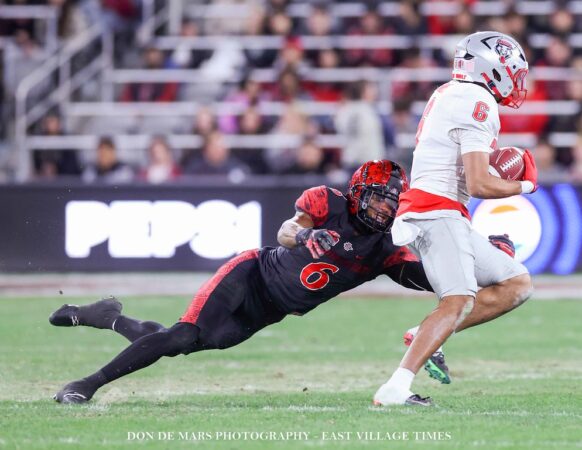
San Diego State football, needing a win on Friday night to capture momentum in its quest to reach bowl eligibility, fell to New Mexico 21-16.
Against a defense that came into the contest, giving up an average of 492.3 yards per game, SDSU managed only 341. It was only the third time the Lobos had given up fewer than 400 yards and just the fifth game under 500 this season. The best stat that paints the picture of the Aztecs’ ineptitude is yards per play.
SDSU’s 88 plays were the most against the Lobos this season. New Mexico surrendered an average of 7.1 yards per play against the rest of its schedule, but the Aztecs only mustered 3.9.
“To get good at this and be able to execute the complexities of our system … you’ve got to be able to practice it to get better at it,” head coach Sean Lewis said postgame. “We’ve been hampered and limited by who’s been able to practice. … That leads to an inconsistency in the execution, and I have to do a better job building that plan so we can be operating at a higher level and higher clip from the very first drive to the very last drive and have that amount of production that I believe this team is capable of having.”
Lewis has not been SDSU’s head coach for a year; that anniversary is approaching in a few weeks. The complete roster remake that appeared necessary to implement his schemes at the time of his hire has proven true. However, visible signs of improvement or adjustment to the challenges Lewis described are absent.
The Aztecs have yet to outscore an FBS opponent in the second half. Overall, they have a 104-58 deficit after intermission in those contests. Growth over the final three games is vital.
“Probably got to identify what the kids do best and … replicate that over and over again,” Lewis said when asked what he can do to spur the offense. “It’s like one week we do one thing really well, and you try to build a game plan around that, and then it’s not as strong as it was the week prior.”
“So again, really taking a deep dive into what it is that we truly do consistently well so we can build a plan around that so when you get in those critical moments wherever it might be – the beginning of the game, the end of the game, third down, red area – that you can lean on those things and do what you do well and lean on the players that you know you can count on.”
Lewis’ questionable personnel decisions have made it challenging to discover what the Aztecs do well. The most explosive player on SDSU’s roster has been Jordan Napier. Amazingly, Friday was his first start of the season, and that only occurred because Ja’Shaun Poke was injured.
After two weeks of being the complement in the offense, Marquez Cooper moved back to the centerpiece. Cooper will likely surpass 1,000 yards against UNLV this week, but he has only averaged 3.8 yards per carry against FBS opponents. Would that number be higher if Lewis gave other backs on the roster more touches?
Cooper was mature in shouldering the blame for the low production, but Lewis needs to put him in a better position to succeed. SDSU’s offense emphasizes creating superior numbers in the rushing game by having the quarterback control the C gap. With the injuries to the offensive line, its importance should be heightened, but the Aztecs have not been skilled at it all year. New Mexico ignored the QB all night in the read/option and keyed on Cooper.
Cooper has been bottled up like never before in his career. Only once against an FBS opponent did he carry the ball over 20 times in a game and average four yards per carry. That was against Cal when Javance Tupou’ata-Johnson started.
“It probably has to do with a lot of things I’m working through with the personnel that we’re trying to figure out what’s best,” Lewis explained. “The number of combinations that we’ve played with on the offensive line up front, a young quarterback who’s coming into his own, multiple factors that go into it. But it starts and finishes with me. I got to do a better job in ironing out where the holes are and making sure we’re putting ourselves in the best position to be successful.”
The personnel issues Lewis described exist because he was ineffective in convincing SDSU’s best 2023 players to stay and in finding adequate athletes to replace them. Even with the defections, most of the Aztecs’ best performers—Napier, Trey White, Chris Johnson, and Eric Butler—were holdovers from the previous staff.
There have been murmurs all season that Lewis has favored the athletes he recruited over the group he inherited. Forty-four of the 84 scholarship players are new to the program. This group has earned about double the number of starts as those with history at SDSU.
Coaches play those they brought in because they fit better in their scheme. Those who sit their best players do not last long in the industry, so it is doubtful favoritism has played a decisive role in who has seen time this season.
The offense’s lack of production and growth, however, gives credence to the perception that Lewis chose loyalty and building for the future over winning in 2024. Discontent over playing time is a constant in every locker room across America. This offseason will test how prevalent the idea is at SDSU. Building momentum over the final three games will be imperative in keeping the top athletes from transferring and attracting higher-quality players from the portal.
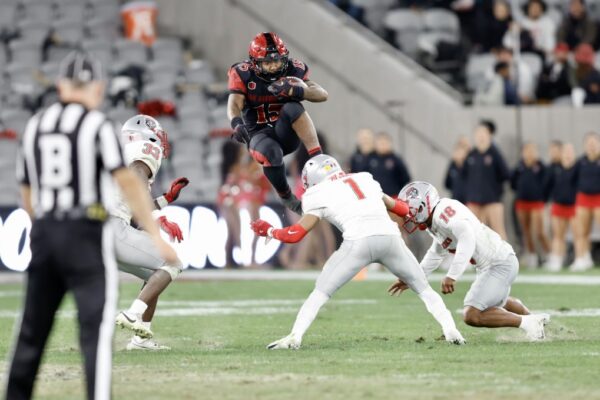
What the loss means
In the context of the season, the loss means the Aztecs will need three wins in three weeks to reach bowl eligibility. SDSU’s squandered opportunity against Central Michigan looms large because it left them no room for a flat performance against another evenly matched team.
New Mexico controlled Friday’s game. The Lobos led for all but about four minutes of the contest. SDSU had ten possessions on the night. It gained more than forty yards on only three of them. Thirty of the 65 yards gained on the Aztecs only touchdown drive came due to penalties.
SDSU threw for 195 yards on 42 attempts. It was the third time this century and the first since 2010 that the program had over 40 throws but failed to top 200 yards. In 2003, the Aztecs lost 16-13 to no. 2 Ohio State, throwing for 188 yards on 41 tries. A 27-24 road loss at Missouri was the other. Considering the circumstances and the opponents, the team’s performance last week was far worse.
“It’s still bowl game hopes,” Cooper said on the team’s goals. “Tonight shattered our conference championship hopes a little bit – not a little bit, but clearly. We look forward to a bowl game.”
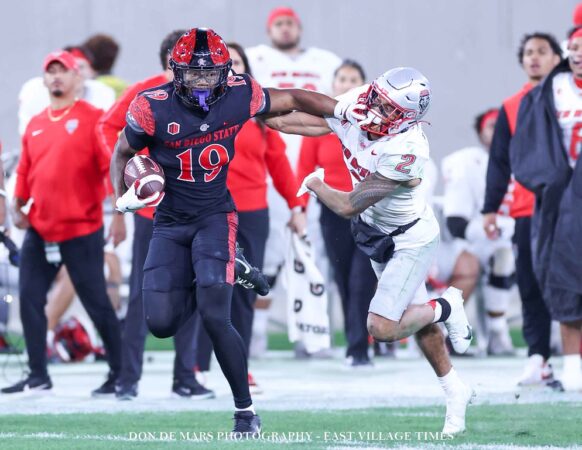
Player of the Game: Jordan Napier
Where would this offense be without Jordan Napier? The redshirt freshman had a career-high 142 all-purpose yards, including 63 receiving and 79 kickoff return yards. The rest of the receivers and tight ends had 156 combined.
As the night wore on, New Mexico keyed on stopping Napier, and the passing game’s production dropped. SDSU threw for 80 yards in the first quarter, 56 in the second, 39 in the third, and 20 in the fourth. Napier was targeted six times in the opening 15 minutes and made six catches for 52 yards. Over the final 45 minutes, ten more passes were thrown his way, but only three were completed for 11 yards. Overall, his nine receptions were the most in his young career.
Napier’s highlights included an over-the-shoulder 40-yard grab on Danny O’Neil’s best ball of the night. He also ran back a kickoff for 61 yards. Both plays led to field goals that kept the Aztecs close following New Mexico touchdowns on two of its first three drives.
“It was going to be a game-time decision [for Ja’Shaun Poke],” Lewis explained. “As we’ve talked all along, we think practice repetition is game reality, and Jordan was open, available, and able to execute the plan all throughout the week. Obviously, his play has warranted him getting his first start.”
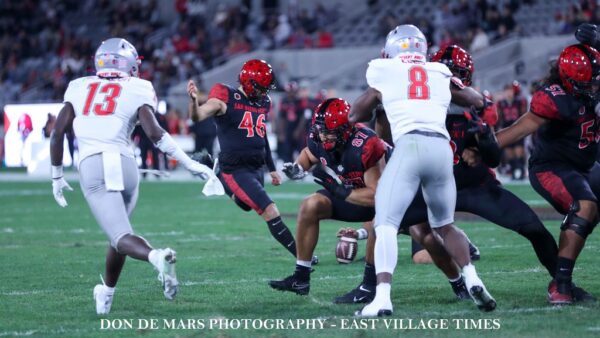
Unsung Hero: Gabriel Plascencia
Gabriel Plascencia provided nine of SDSU’s 16 points on Friday. He raised numbers to 11-12 on the season and 15-16 in his career. Plascencia missed one kick in the opener but has been true on ten straight since that contest.
In channeling his predecessors, Plascencia even got a tackle on a kickoff return. He did more than just get in the way of New Mexico’s returner. He delivered a blow.
“A guy who is consistently good, not occasionally great,” Lewis said in describing Plascencia. “We knew at the start of the year he had earned the job. Now that he’s got it and it’s his, he’s really taken ownership of it, and regardless of where we’re at, conditions, the play, whatever the case might be, he’s got a single-minded focus that when he goes out there, there’s going to be points on the board and he’s done a great job with it.”
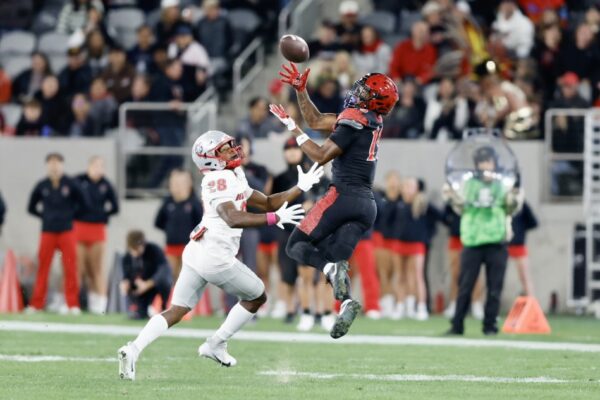
Two-Minute Drill:
- The sparse crowd was expected, given how the team has performed this year, the weather, and day of the week. As the future of college football is likely headed to revenue sharing, nights like these will make it even harder for SDSU to compete.
- The smallest number of recruits gathered to watch SDSU on Friday. High school playoff football began on the same evening across the state.
- The Marching Aztecs played the anthems for the military branches. The largest applause came for the Navy.
- Four of the announced starters pregame were incorrect.
- Freddy Keiho did a great job coming onto the field as the Honorary Warrior.
- Two of SDSU’s road opponents – Wyoming and Boise State – were led onto the field by someone on horseback. That level of excitement and focus has not been seen at SDSU since they decided to go without a mascot.
- Another issue with SDSU’s offense is its inability to overcome negative plays. A punt is likely if SDSU commits a penalty or suffers a tackle for loss.
- The pick play that took a touchdown off the board was a curious play design. All night, the Aztecs timed intentional blocks outside after quick receptions. The timing was off on the play which led to the penalty.
- While the severity of Danny O’Neil’s shoulder issues is not known, it is clearly bothering him. He was slow to get up after every hit. His range of motion appeared limited in pregame stretching. His toughness continues to impress.
- The bubble screen was prevalent in the game plan. This also impacted the high number of throws but low passing yards per attempt.
- Opposing offenses continue to attack SDSU’s EDGEs in the run game. Brady Nassar started at field EDGE because he is more stout at the point of attack. The Aztecs had a more balanced back end, providing an overhang of sorts to help Trey White at boundary EDGE.
- Part of the offense’s issues is poor blocking by its tight ends. Jude Wolfe and Michael Harrison are not dominant in this regard. It puts the Aztecs at a disadvantage. Injuries to Logan Tanner before he transferred and Gabe Garretson hurt SDSU this season.
- New Mexico’s win was its first in the series since 2008. It snapped a nine-game SDSU winning streak.
- Friday was only the fifth time in the Aztecs’ last 43 opportunities that they lost when leading after three quarters.
- The Aztecs’ 88 plays were its most since 99 against Eastern Illinois in 2013.
- SDSU converted 11 third downs in 20 attempts. It was SDSU’s best performance in that category since 2020.
My earliest sport’s memory involve tailgating at the Murph, running down the circular exit ramps, and seeing the Padres, Chargers and Aztecs play. As a second generation Aztec, I am passionate about all things SDSU. Other interests include raising my four children, being a great husband and teaching high school.
I agree with the author the best performing players this year has been the players’ Coach Lewis inherited. You can see talent, but the lack of discipline has cost us game after game. There is just too much talent regulated to the bench that makes the prospect of portal defections a serious concern. Just because many of these talented proven players are juniors does mean they will be here next year.